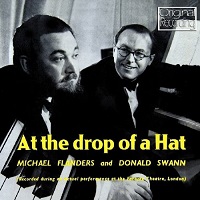 Original Cast (London and Broadway), 1959 (Angel)
Original Cast (London and Broadway), 1959 (Angel)  (4 / 5) Producer Alexander Cohen had the good sense to bring a host of newcomers to Broadway from England, among them Michael Flanders and Donald Swann, the two raconteurs of At the Drop of a Hat. These wonderful songwriters-performers included the audience in their nightly party at the Golden Theatre. (Several years later, Broadway saw the sequel, At the Drop of Another Hat.) The songs are in the grand satirical/political tradition of the late 1950s-early ’60s. Their humor was a little naughty, silly and sophisticated by turns, with lots of allusions that belied the songs’ supposed simplicity. Intellectuals and average theatergoers could find equal amusement in the evening, albeit with different depths of understanding. Wisely, the original cast album was recorded in London before a live audience, which makes all the difference. Not only are we cued as to where the laughs are, but we also feel part of the inside group that’s enjoying these masters of song and monologue. This is one comedy record that can never be overplayed; the music and lyrics sound just as fresh the 50th time as the first, unlike many such albums. — Ken Bloom
(4 / 5) Producer Alexander Cohen had the good sense to bring a host of newcomers to Broadway from England, among them Michael Flanders and Donald Swann, the two raconteurs of At the Drop of a Hat. These wonderful songwriters-performers included the audience in their nightly party at the Golden Theatre. (Several years later, Broadway saw the sequel, At the Drop of Another Hat.) The songs are in the grand satirical/political tradition of the late 1950s-early ’60s. Their humor was a little naughty, silly and sophisticated by turns, with lots of allusions that belied the songs’ supposed simplicity. Intellectuals and average theatergoers could find equal amusement in the evening, albeit with different depths of understanding. Wisely, the original cast album was recorded in London before a live audience, which makes all the difference. Not only are we cued as to where the laughs are, but we also feel part of the inside group that’s enjoying these masters of song and monologue. This is one comedy record that can never be overplayed; the music and lyrics sound just as fresh the 50th time as the first, unlike many such albums. — Ken Bloom
All posts by Michael Portantiere
At Home Abroad
 Studio Recordings by the Original Broadway Cast, 1935 (Smithsonian/no CD)
Studio Recordings by the Original Broadway Cast, 1935 (Smithsonian/no CD)  (3 / 5) Star-packed musical revue were always welcome attractions on Broadway during the Depression years. Billed as “A Musical Holiday,” At Home Abroad bolstered its thin and engaging overall theme — Americans traveling to foreign countries — with a fine score by Arthur Schwartz and Howard Dietz and a cast headed by Beatrice Lillie, Ethel Waters, and Eleanor Powell. The show was designed and staged with a good deal of dazzle by a gifted newcomer, Vincente Minnelli; even so, its 198-performance run was felt to be something of a disappointment. Despite this, the cast members made a number of studio recordings of songs from the score, including Waters’ insinuating “Thief in the Night” and two definitive Bea Lillie numbers, “Paree” and “Get Yourself a Geisha” — the latter with its insistent refrain, “It’s better with your shoes off.” As part of an ongoing effort to reconstruct lost musicals, the Smithsonian Institution issued an LP that collected these items and added a few numbers recorded later by Karen Morrow, Nancy Dussault, and other performers. If the score lacks the classic stature of Schwartz and Dietz’s earlier The Band Wagon, there’s still a lot to treasure here, including Eleanor Powell’s extended tap breaks in “What a Wonderful World” and “Got a Bran’ New Suit.” As always with Smithsonian releases, the accompanying notes detail the recordings with both erudition and enthusiasm. — Richard Barrios
(3 / 5) Star-packed musical revue were always welcome attractions on Broadway during the Depression years. Billed as “A Musical Holiday,” At Home Abroad bolstered its thin and engaging overall theme — Americans traveling to foreign countries — with a fine score by Arthur Schwartz and Howard Dietz and a cast headed by Beatrice Lillie, Ethel Waters, and Eleanor Powell. The show was designed and staged with a good deal of dazzle by a gifted newcomer, Vincente Minnelli; even so, its 198-performance run was felt to be something of a disappointment. Despite this, the cast members made a number of studio recordings of songs from the score, including Waters’ insinuating “Thief in the Night” and two definitive Bea Lillie numbers, “Paree” and “Get Yourself a Geisha” — the latter with its insistent refrain, “It’s better with your shoes off.” As part of an ongoing effort to reconstruct lost musicals, the Smithsonian Institution issued an LP that collected these items and added a few numbers recorded later by Karen Morrow, Nancy Dussault, and other performers. If the score lacks the classic stature of Schwartz and Dietz’s earlier The Band Wagon, there’s still a lot to treasure here, including Eleanor Powell’s extended tap breaks in “What a Wonderful World” and “Got a Bran’ New Suit.” As always with Smithsonian releases, the accompanying notes detail the recordings with both erudition and enthusiasm. — Richard Barrios
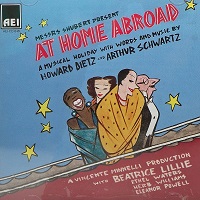 Live and Studio Recordings by the Original Broadway Cast, 1935 (AEI)
Live and Studio Recordings by the Original Broadway Cast, 1935 (AEI)  (3 / 5) The Smithsonian collection might have seemed the last word on At Home Abroad, but guess again. It turns out that there also exists a set of decrepit discs containing recordings of large portions of the show in live performance. Whether or not the source was a radio broadcast is unclear; although the sound quality gives new meaning to the phrase “low fidelity,” the material was skillfully transferred to the digital domain by the intrepid folks at AEI. The studio recordings by Beatrice Lillie, Ethel Waters, and Eleanor Powell noted in the review above are also included on the CD, and the patient listener will be rewarded with a very good sense of how this big and bouncy show operated. AEI obviously took great care with the project, going so far as to splice parts of Lillie’s studio version of “Dinner Napkins” into an otherwise live recording so as to get the best overall sound quality possible. Especially to be enjoyed here are Waters’ live performances of “Loading Time” and “Got a Bran’ New Suit,” which she did not record otherwise. Unfortunately, the CD booklet notes are inadequate — a chronic failing with AEI. And it’s really too bad that the original recording technology sounds as if it relied on tin cans and strings. — R.B.
(3 / 5) The Smithsonian collection might have seemed the last word on At Home Abroad, but guess again. It turns out that there also exists a set of decrepit discs containing recordings of large portions of the show in live performance. Whether or not the source was a radio broadcast is unclear; although the sound quality gives new meaning to the phrase “low fidelity,” the material was skillfully transferred to the digital domain by the intrepid folks at AEI. The studio recordings by Beatrice Lillie, Ethel Waters, and Eleanor Powell noted in the review above are also included on the CD, and the patient listener will be rewarded with a very good sense of how this big and bouncy show operated. AEI obviously took great care with the project, going so far as to splice parts of Lillie’s studio version of “Dinner Napkins” into an otherwise live recording so as to get the best overall sound quality possible. Especially to be enjoyed here are Waters’ live performances of “Loading Time” and “Got a Bran’ New Suit,” which she did not record otherwise. Unfortunately, the CD booklet notes are inadequate — a chronic failing with AEI. And it’s really too bad that the original recording technology sounds as if it relied on tin cans and strings. — R.B.
The Athenian Touch
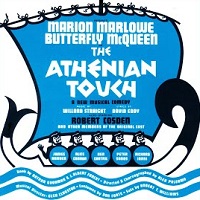 Original Off-Broadway Cast, 1964 (Broadway East/AEI) No stars, not recommended. One day, sometime in the 1980s, several boxes of the long-out-of-print LP of The Athenian Touch turned up in a store in midtown Manhattan. Musical theater enthusiasts swarmed the place, and the shop was depleted of copies in one afternoon. Then people got home and actually played the thing, finding to their dismay that this cast album is as bad as they get. In most musicals, the music is usually the “safest” component; even if the book and/or lyrics are poor, there are often at least a couple of tunes with some appeal. That’s not the case here. Not only do these songs have useless lyrics by David Eddy, but further than that, Willard Straight’s music is ugly. And, judging on the basis of what can be gleaned from listening to the album, the book — a love story involving Aristophanes and some whore — is simply not a professional effort. Camp followers may be interested in the recording because it stars Butterfly McQueen and Marion Marlowe, the Arthur Godfrey TV show favorite who also played Elsa in the original Broadway production of The Sound of Music, but there’s really no other reason to purchase it. — David Wolf
Original Off-Broadway Cast, 1964 (Broadway East/AEI) No stars, not recommended. One day, sometime in the 1980s, several boxes of the long-out-of-print LP of The Athenian Touch turned up in a store in midtown Manhattan. Musical theater enthusiasts swarmed the place, and the shop was depleted of copies in one afternoon. Then people got home and actually played the thing, finding to their dismay that this cast album is as bad as they get. In most musicals, the music is usually the “safest” component; even if the book and/or lyrics are poor, there are often at least a couple of tunes with some appeal. That’s not the case here. Not only do these songs have useless lyrics by David Eddy, but further than that, Willard Straight’s music is ugly. And, judging on the basis of what can be gleaned from listening to the album, the book — a love story involving Aristophanes and some whore — is simply not a professional effort. Camp followers may be interested in the recording because it stars Butterfly McQueen and Marion Marlowe, the Arthur Godfrey TV show favorite who also played Elsa in the original Broadway production of The Sound of Music, but there’s really no other reason to purchase it. — David Wolf
Arms and the Girl
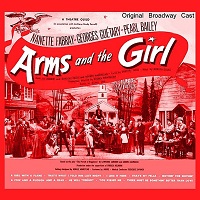 Original Broadway Cast, 1948 (Decca)
Original Broadway Cast, 1948 (Decca)  (3 / 5) The Theatre Guild was riding the success of the still-running Oklahoma! when Armina Marshall Langner suggested that The Pursuit of Happiness, a play she had written with her husband, Lawrence Langner, would make a good musical. Rouben Mamoulian, who had directed the Guild’s earlier successes (including Porgy and Bess, Oklahoma!, and Carousel), was brought in to helm Arms and the Girl. Morton Gould and Dorothy Fields wrote the score, their only Broadway collaboration. Judging from the cast album, the show was distinguished primarily by its three leading performers: Georges Guetary (a French musical theater star), Nanette Fabray, and Pearl Bailey. For Fabray, this was another unsuccessful vehicle that would keep her from achieving major Broadway stardom on a par with Ethel Merman and Mary Martin. Still, her work here is colorful and exciting in “Girl With a Flame” and “That’s My Fella.” She’s great in her duets with Guetary, who does also does well with the charming if corny “A Cow and a Plow and a Frau.” But the big news of the show was Pearl Bailey in a scene-stealing role. She played a slave who changes her name according to where she is geographically — so, as “Connecticut,” she sings the bawdily humorous “There Must Be Something Better than Love” and the lesser “Nothin’ for Nothin’.” Note: The CD edition of this album also includes cast recordings of Up in Central Park; both albums have been meticulously remastered, and they sound as good as any recordings of the period could be expected to. The disc filled an important gap in the catalogue, so we should be grateful to Decca Broadway for its release. — Jeffrey Dunn
(3 / 5) The Theatre Guild was riding the success of the still-running Oklahoma! when Armina Marshall Langner suggested that The Pursuit of Happiness, a play she had written with her husband, Lawrence Langner, would make a good musical. Rouben Mamoulian, who had directed the Guild’s earlier successes (including Porgy and Bess, Oklahoma!, and Carousel), was brought in to helm Arms and the Girl. Morton Gould and Dorothy Fields wrote the score, their only Broadway collaboration. Judging from the cast album, the show was distinguished primarily by its three leading performers: Georges Guetary (a French musical theater star), Nanette Fabray, and Pearl Bailey. For Fabray, this was another unsuccessful vehicle that would keep her from achieving major Broadway stardom on a par with Ethel Merman and Mary Martin. Still, her work here is colorful and exciting in “Girl With a Flame” and “That’s My Fella.” She’s great in her duets with Guetary, who does also does well with the charming if corny “A Cow and a Plow and a Frau.” But the big news of the show was Pearl Bailey in a scene-stealing role. She played a slave who changes her name according to where she is geographically — so, as “Connecticut,” she sings the bawdily humorous “There Must Be Something Better than Love” and the lesser “Nothin’ for Nothin’.” Note: The CD edition of this album also includes cast recordings of Up in Central Park; both albums have been meticulously remastered, and they sound as good as any recordings of the period could be expected to. The disc filled an important gap in the catalogue, so we should be grateful to Decca Broadway for its release. — Jeffrey Dunn
How to Steal an Election
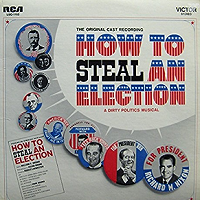 Original Off-Broadway Cast, 1968 (RCA/no CD)
Original Off-Broadway Cast, 1968 (RCA/no CD)  (2 / 5) A young black man (Clifton Davis) and a young white woman (Carole Demas), both veterans of the disastrous 1968 Democratic National Convention in Chicago, somehow meet Calvin Coolidge (D.R. Allen), who essentially gives them a lesson in the various forms of chicanery that resulted in the election of many American presidents. Combining authentic songs from past political campaigns with Oscar Brand’s new book songs for the two young idealists, How to Steal an Election has Cal trying to convince the kids that at least some trickery is necessary for the system to work. (After the young woman sings “Mr. Might’ve Been,” about President Kennedy, Coolidge reveals that her hero was not above some questionable political maneuvers.) The new songs are of varying quality, the old songs are interesting and sometimes funny, and the show’s subject matter is surprisingly topical in the early years of the 21st century. But, of course, the lesson imparted here — that stealing elections is somehow a good thing — is highly debatable. — David Wolf
(2 / 5) A young black man (Clifton Davis) and a young white woman (Carole Demas), both veterans of the disastrous 1968 Democratic National Convention in Chicago, somehow meet Calvin Coolidge (D.R. Allen), who essentially gives them a lesson in the various forms of chicanery that resulted in the election of many American presidents. Combining authentic songs from past political campaigns with Oscar Brand’s new book songs for the two young idealists, How to Steal an Election has Cal trying to convince the kids that at least some trickery is necessary for the system to work. (After the young woman sings “Mr. Might’ve Been,” about President Kennedy, Coolidge reveals that her hero was not above some questionable political maneuvers.) The new songs are of varying quality, the old songs are interesting and sometimes funny, and the show’s subject matter is surprisingly topical in the early years of the 21st century. But, of course, the lesson imparted here — that stealing elections is somehow a good thing — is highly debatable. — David Wolf
archy and mehitabel
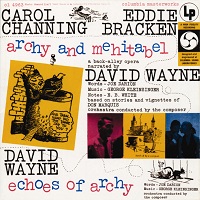 Concept Album, 1954 (Columbia/Masterworks Broadway)
Concept Album, 1954 (Columbia/Masterworks Broadway)  (3 / 5) Based on the 1920s newspaper columns of Don Marquis, archy and mehitabel stars a cockroach. Ostensibly, the columns were the work of said cockroach, named archy, who wrote them for Marquis in exchange for some apple peels left in the trash. The roach handled the mechanics of writing by hurling himself head first at the typewriter keys, and everything was in lower case because he couldn’t reach the shift key. This recording is sort of a grab-bag suite taken from different archy pieces, with scenes and narration by Joe Darion (lyricist of Man of La Mancha) underscored with music by George Kleinsinger (composer of Tubby the Tuba). The underscoring provides a real New York atmosphere, and it occasionally explodes into whimsical songs and entertaining melodic fragments. The text is made of of archy’s thoughts (e.g., “people may think they amount to a great deal, but to a mosquito, they’re just a meal”) and stories of the odd characters he runs into. Most of his stories are about mehitabel (Carol Channing), the alley cat whom he loves unrequitedly. She takes up with a disreputable tomcat that leaves her with a litter of kittens saved by archy (Eddie Bracken) from drowning in a rainstorm. She “studies acting” with a disreputable old theater cat, then reluctantly gives in and takes a job as a house cat — but, unable to stand domesticity, she returns to the alley. In 1957, the piece was adapted for the stage as Shinbone Alley, with a full Kleinsinger-Darion score and a book by Mel Brooks; Eddie Bracken repeated his role, and Eartha Kitt played mehitabel. Three years after the Broadway failure, it turned up in a two-hour TV adaptation with Bracken and Tammy Grimes. Finally, in 1970, it became an animated cartoon with Bracken and Channing. Pirated recordings exist of the TV version, and there is also a complete, live pirate of the Broadway show, but the concept album is the only commercial recording available. — David Wolf
(3 / 5) Based on the 1920s newspaper columns of Don Marquis, archy and mehitabel stars a cockroach. Ostensibly, the columns were the work of said cockroach, named archy, who wrote them for Marquis in exchange for some apple peels left in the trash. The roach handled the mechanics of writing by hurling himself head first at the typewriter keys, and everything was in lower case because he couldn’t reach the shift key. This recording is sort of a grab-bag suite taken from different archy pieces, with scenes and narration by Joe Darion (lyricist of Man of La Mancha) underscored with music by George Kleinsinger (composer of Tubby the Tuba). The underscoring provides a real New York atmosphere, and it occasionally explodes into whimsical songs and entertaining melodic fragments. The text is made of of archy’s thoughts (e.g., “people may think they amount to a great deal, but to a mosquito, they’re just a meal”) and stories of the odd characters he runs into. Most of his stories are about mehitabel (Carol Channing), the alley cat whom he loves unrequitedly. She takes up with a disreputable tomcat that leaves her with a litter of kittens saved by archy (Eddie Bracken) from drowning in a rainstorm. She “studies acting” with a disreputable old theater cat, then reluctantly gives in and takes a job as a house cat — but, unable to stand domesticity, she returns to the alley. In 1957, the piece was adapted for the stage as Shinbone Alley, with a full Kleinsinger-Darion score and a book by Mel Brooks; Eddie Bracken repeated his role, and Eartha Kitt played mehitabel. Three years after the Broadway failure, it turned up in a two-hour TV adaptation with Bracken and Tammy Grimes. Finally, in 1970, it became an animated cartoon with Bracken and Channing. Pirated recordings exist of the TV version, and there is also a complete, live pirate of the Broadway show, but the concept album is the only commercial recording available. — David Wolf
Almost Famous
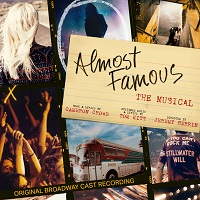 Original Broadway Cast, 2022 (Masterworks Broadway)
Original Broadway Cast, 2022 (Masterworks Broadway)  (2 / 5) Meet the semi-jukebox musical: Almost Famous, based on the film about a 1970s rock band and the teen journalist William (Casey Likes) who embeds himself on tour, blends original songs by Tom Kitt and the film’s screenwriter, Cameron Crowe, with period hits and an occasional song written for the film. The problem is that the jukebox tunes — such as Elton John’s “Tiny Dancer,” Cat Stevens’ “The Wind,” and Joni Mitchell’s “River” — are far superior to the new material, especially as presented through Kitt’s characteristically lovely arrangements. Anika Larsen nails her big number in the role of William’s mother, lamenting in “Elaine’s Lecture” that “rock stars have kidnapped my son.” That’s really the show’s only effective character piece, since most of the new songs for Likes, Chris Wood as band frontman Russell, and Solea Pfeiffer as the mysterious, captivating groupie Penny Lane lack distinction. Pfeiffer in particular sounds stellar, but her songs aren’t worthy of her vocal maturity. The lyrics, by Kitt and Crowe, seldom sculpt the characters with any specificity. And even if songs like “Everybody’s Coming Together” aren’t from the jukebox, in a sense they might as well be: “Come join the revolution tonight / Be part of the solution tonight,” the ensemble sings generically. In a Broadway landscape overtaken by creators trying to make jukebox musicals and film adaptations theatrically viable, Almost Famous isn’t part of the solution on either count. — Dan Rubins
(2 / 5) Meet the semi-jukebox musical: Almost Famous, based on the film about a 1970s rock band and the teen journalist William (Casey Likes) who embeds himself on tour, blends original songs by Tom Kitt and the film’s screenwriter, Cameron Crowe, with period hits and an occasional song written for the film. The problem is that the jukebox tunes — such as Elton John’s “Tiny Dancer,” Cat Stevens’ “The Wind,” and Joni Mitchell’s “River” — are far superior to the new material, especially as presented through Kitt’s characteristically lovely arrangements. Anika Larsen nails her big number in the role of William’s mother, lamenting in “Elaine’s Lecture” that “rock stars have kidnapped my son.” That’s really the show’s only effective character piece, since most of the new songs for Likes, Chris Wood as band frontman Russell, and Solea Pfeiffer as the mysterious, captivating groupie Penny Lane lack distinction. Pfeiffer in particular sounds stellar, but her songs aren’t worthy of her vocal maturity. The lyrics, by Kitt and Crowe, seldom sculpt the characters with any specificity. And even if songs like “Everybody’s Coming Together” aren’t from the jukebox, in a sense they might as well be: “Come join the revolution tonight / Be part of the solution tonight,” the ensemble sings generically. In a Broadway landscape overtaken by creators trying to make jukebox musicals and film adaptations theatrically viable, Almost Famous isn’t part of the solution on either count. — Dan RubinsBring It On
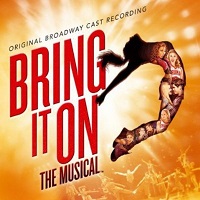 Original Broadway Cast, 2012 (Backlot Music)
Original Broadway Cast, 2012 (Backlot Music)  (3 / 5) If you love Lin-Manuel Miranda’s score for In the Heights, you’ll find lots of pleasures in Bring It On. This musical adaptation of a 2000 film about cheerleaders is copiously sprinkled with Miranda emeralds. About two thirds of the songs are by Tom Kitt and Amanda Green, writing in a lively, poppish vein that sounds familiar within the high school musical genre (though buoyantly orchestrated by Kitt and Alex Lacamoire), but the remaining numbers by Miranda ignite on a different level. Though too many of his songs here may build just like In The Heights‘ “96,000” — this show doesn’t celebrate his full range as a composer — they’re fun individually, and “It’s All Happening,” the Act II opener, is as explosive and ebullient as anything Miranda has written. The centerpiece of that song is a cheeky rap for Twig (Nick Womack), in a style reminiscent of In the Heights‘ Sonny, arguing for the virtues of boys joining the cheerleading team. But even though there are deeper themes like friendship across differences and finding your squad, most of the songs are really just about cheerleading, a topic that can only animate so many distinct musical numbers. If the well of inspiration eventually runs dry, that’s no fault of the electric cast, led by Taylor Louderman and Adrienne Warren as reluctant teammates-turned-besties. There is also a delightful early performance from Ariana DeBose. — Dan Rubins
(3 / 5) If you love Lin-Manuel Miranda’s score for In the Heights, you’ll find lots of pleasures in Bring It On. This musical adaptation of a 2000 film about cheerleaders is copiously sprinkled with Miranda emeralds. About two thirds of the songs are by Tom Kitt and Amanda Green, writing in a lively, poppish vein that sounds familiar within the high school musical genre (though buoyantly orchestrated by Kitt and Alex Lacamoire), but the remaining numbers by Miranda ignite on a different level. Though too many of his songs here may build just like In The Heights‘ “96,000” — this show doesn’t celebrate his full range as a composer — they’re fun individually, and “It’s All Happening,” the Act II opener, is as explosive and ebullient as anything Miranda has written. The centerpiece of that song is a cheeky rap for Twig (Nick Womack), in a style reminiscent of In the Heights‘ Sonny, arguing for the virtues of boys joining the cheerleading team. But even though there are deeper themes like friendship across differences and finding your squad, most of the songs are really just about cheerleading, a topic that can only animate so many distinct musical numbers. If the well of inspiration eventually runs dry, that’s no fault of the electric cast, led by Taylor Louderman and Adrienne Warren as reluctant teammates-turned-besties. There is also a delightful early performance from Ariana DeBose. — Dan RubinsColette / Colette Collage
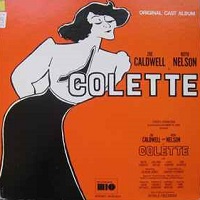 Original Off-Broadway Cast, 1970 (MIO International/no CD)
Original Off-Broadway Cast, 1970 (MIO International/no CD)  (3 / 5) This version of Colette is a charming play with music. The play itself was written by Elinor Jones, then married to lyricist Tom Jones. Colette is portrayed by Zoe Caldwell, who attacks the role boldly, and Ruth Nelson gives a vivid performance as Colette’s mother. The other actors — Keith Charles, Holland Taylor, Louis Turenne, and Tom Aldredge — are fine but, on the record anyway, they’re just props. Tom Jones and composer Harvey Schmidt contributed three songs that begin the recording; all of them are odd and delightful, and one of them, “Earthly Paradise,” is as lovely as anything the team ever wrote. Schmidt’s underscoring of a long montage sequence is stunning — it plays almost like a short comic ballet — and his gorgeous, dramatic music fills the recording. The composer was onstage throughout the play, in period costume, accompanying the action on piano. Apparently, the music was improvised every night during the run; when Schmidt was out ill, performances had to be canceled, since no one else could play the music because he had never written it down! — David Wolf
(3 / 5) This version of Colette is a charming play with music. The play itself was written by Elinor Jones, then married to lyricist Tom Jones. Colette is portrayed by Zoe Caldwell, who attacks the role boldly, and Ruth Nelson gives a vivid performance as Colette’s mother. The other actors — Keith Charles, Holland Taylor, Louis Turenne, and Tom Aldredge — are fine but, on the record anyway, they’re just props. Tom Jones and composer Harvey Schmidt contributed three songs that begin the recording; all of them are odd and delightful, and one of them, “Earthly Paradise,” is as lovely as anything the team ever wrote. Schmidt’s underscoring of a long montage sequence is stunning — it plays almost like a short comic ballet — and his gorgeous, dramatic music fills the recording. The composer was onstage throughout the play, in period costume, accompanying the action on piano. Apparently, the music was improvised every night during the run; when Schmidt was out ill, performances had to be canceled, since no one else could play the music because he had never written it down! — David Wolf
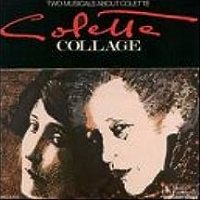 Off-Broadway Cast Members, 1994 (Varèse Sarabande)
Off-Broadway Cast Members, 1994 (Varèse Sarabande)  (2 / 5) A production of the full-length musical Colette that starred Diana Rigg was intended for Broadway but closed on the road in 1982. Librettist and composer Jones and Schmidt revised the show in ’83 and again in ’91; along the way, it was retitled Colette Collage. Act I of the final version concentrates on the French novelist’s first marriage to Willy, a writer who thinks nothing of publishing work by others — including his wife — under his own name. Her books, which everyone thinks are his books, become hugely successful, and she finally leaves him. Act II covers Coletee’s later years of fame and her relationship with a younger man, Maurice. The music is lovely, amusing, and evocative, but nothing here is as beautiful as Schmidt’s best work. Colette is played by Judy Blazer in the first act, Judy Kaye in the second; both sing gloriously and are matched by George Lee Andrews as Willy, Rita Gardner as Colette’s mother, and Jason Graae as Maurice. The only piece retained from the Elinor Jones play is Schmidt’s thrilling music-hall-tour montage, cut down and fitted with lyrics by Jones. Unfortunately, it’s less effective here than as presented on the recording reviewed above. — D.W.
(2 / 5) A production of the full-length musical Colette that starred Diana Rigg was intended for Broadway but closed on the road in 1982. Librettist and composer Jones and Schmidt revised the show in ’83 and again in ’91; along the way, it was retitled Colette Collage. Act I of the final version concentrates on the French novelist’s first marriage to Willy, a writer who thinks nothing of publishing work by others — including his wife — under his own name. Her books, which everyone thinks are his books, become hugely successful, and she finally leaves him. Act II covers Coletee’s later years of fame and her relationship with a younger man, Maurice. The music is lovely, amusing, and evocative, but nothing here is as beautiful as Schmidt’s best work. Colette is played by Judy Blazer in the first act, Judy Kaye in the second; both sing gloriously and are matched by George Lee Andrews as Willy, Rita Gardner as Colette’s mother, and Jason Graae as Maurice. The only piece retained from the Elinor Jones play is Schmidt’s thrilling music-hall-tour montage, cut down and fitted with lyrics by Jones. Unfortunately, it’s less effective here than as presented on the recording reviewed above. — D.W.
Anya / The Anastasia Affaire / Anastasia: The Musical
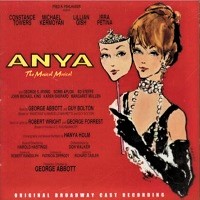 Original Broadway Cast, 1965 (United Artists/Kritzerland)
Original Broadway Cast, 1965 (United Artists/Kritzerland)  (3 / 5) What Robert Wright and George Forrest had previously done successfully with Grieg and Borodin, they did with Rachmaninoff in creating a musical based on the play Anastasia, the story of the woman who claimed to be the only surviving member of the Romanov family assassination. Rachmaninoff’s music was well suited to a piece with action that takes place shortly after the Russian Revolution, and while fans of that music in its original form might find this adaptation hard to take, it’s a lush, beautifully sung, latter-day operetta. Although the show was plodding onstage, the recording is very entertaining. Constance Towers and Michael Kermoyan are excellent in all of their songs, particularly in “My Kind of Love” (the melody had previously served as the basis for the popular hit “Full Moon and Empty Arms”) and the dramatic “Six Palaces” (in which Anya is drilled on the “facts” of her life). Irra Petina, the grande dame of the “floperetta” genre, is a joy in the comic “Leben Sie Wohl” and “On That Day,” and she also leads the haunting “Homeward.” For camp value, there is Lillian Gish as the Grand Duchess, “reciting” lyrics to a vocalise sung by Towers as Anya. Billed as “The Musical Musical,” the show was one of the late-career flops of director George Abbott, who also collaborated on the book with Guy Bolton. (This was Bolton’s final Broadway credit.) The cast album notes detail which Rachmaninoff pieces have been adapted for each song. There are also two songs listed on the back of the original LP jacket that are not actually on the album; they were cut from the show during previews and, from all reports, weren’t recorded. — Jeffrey Dunn
(3 / 5) What Robert Wright and George Forrest had previously done successfully with Grieg and Borodin, they did with Rachmaninoff in creating a musical based on the play Anastasia, the story of the woman who claimed to be the only surviving member of the Romanov family assassination. Rachmaninoff’s music was well suited to a piece with action that takes place shortly after the Russian Revolution, and while fans of that music in its original form might find this adaptation hard to take, it’s a lush, beautifully sung, latter-day operetta. Although the show was plodding onstage, the recording is very entertaining. Constance Towers and Michael Kermoyan are excellent in all of their songs, particularly in “My Kind of Love” (the melody had previously served as the basis for the popular hit “Full Moon and Empty Arms”) and the dramatic “Six Palaces” (in which Anya is drilled on the “facts” of her life). Irra Petina, the grande dame of the “floperetta” genre, is a joy in the comic “Leben Sie Wohl” and “On That Day,” and she also leads the haunting “Homeward.” For camp value, there is Lillian Gish as the Grand Duchess, “reciting” lyrics to a vocalise sung by Towers as Anya. Billed as “The Musical Musical,” the show was one of the late-career flops of director George Abbott, who also collaborated on the book with Guy Bolton. (This was Bolton’s final Broadway credit.) The cast album notes detail which Rachmaninoff pieces have been adapted for each song. There are also two songs listed on the back of the original LP jacket that are not actually on the album; they were cut from the show during previews and, from all reports, weren’t recorded. — Jeffrey Dunn
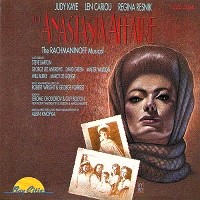 Studio Casts, 1992-1998 (Bay Cities/Original Cast Records)
Studio Casts, 1992-1998 (Bay Cities/Original Cast Records)  (2 / 5) These recordings are not just Anya with two pianos. When it became clear that the 1965 production was going to close on Broadway after 16 performances, director and co-librettist George Abbott graciously ceded all of the rights to Wright and Forrest. The musical was revised and produced regionally as A Song for Anastasia and The Anastasia Game. A recording titled The Anastasia Affaire, based on a production at the Merrimack Theatre in Massachusetts, was released in 1992 and quickly went out of print. In 1998, with the title now changed to Anastasia: The Musical, the CD was reissued with bonus tracks of six “premiere recordings” of Wright and Forrest songs from other shows. The majority of the Rachmaninoff melodies used for Anya were used again in the revisions, but most of them were given new lyrics and made to serve new dramatic functions. While the Broadway score leaned heavily toward “nouveau operetta,” the final version is definitely a chamber musical with two-piano accompaniment, well handled by Albin Konopka and Seth Rudetsky. The principal singers are Judy Kaye, Regina Resnik, Len Cariou, Steve Barton, George Lee Andrews, Walter Willison, and David Green, all in top form. The story of Anastasia is more clearly discerned from the songs in the new version; still, the original Broadway cast album of Anya, with its grand orchestrations and operatic singing, is a more enjoyable listen. — J.D.
(2 / 5) These recordings are not just Anya with two pianos. When it became clear that the 1965 production was going to close on Broadway after 16 performances, director and co-librettist George Abbott graciously ceded all of the rights to Wright and Forrest. The musical was revised and produced regionally as A Song for Anastasia and The Anastasia Game. A recording titled The Anastasia Affaire, based on a production at the Merrimack Theatre in Massachusetts, was released in 1992 and quickly went out of print. In 1998, with the title now changed to Anastasia: The Musical, the CD was reissued with bonus tracks of six “premiere recordings” of Wright and Forrest songs from other shows. The majority of the Rachmaninoff melodies used for Anya were used again in the revisions, but most of them were given new lyrics and made to serve new dramatic functions. While the Broadway score leaned heavily toward “nouveau operetta,” the final version is definitely a chamber musical with two-piano accompaniment, well handled by Albin Konopka and Seth Rudetsky. The principal singers are Judy Kaye, Regina Resnik, Len Cariou, Steve Barton, George Lee Andrews, Walter Willison, and David Green, all in top form. The story of Anastasia is more clearly discerned from the songs in the new version; still, the original Broadway cast album of Anya, with its grand orchestrations and operatic singing, is a more enjoyable listen. — J.D.
Ambassador
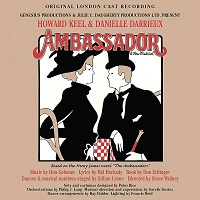 Original London Cast, 1971 (RCA/Stage Door)
Original London Cast, 1971 (RCA/Stage Door)  (2 / 5) The original London cast album of this Henry James adaptation is also the de facto original Broadway cast album, since the West End’s two leads, Howard Keel and Danielle Darrieux, reprised their roles in New York not long after the show’s quick demise in London, and they carry the bulk of the musical program. James’ favorite theme, the clash of American ingenuousness and European worldliness, gets a thorough working-over in this story of a New England milquetoast named Lambert (Keel) dispatched to Paris by a dominating widow to retrieve her philandering son. Instead, Lambert falls under the spell of Paree and, more specifically, of a fascinating countess (Darrieux). The globe-trotting narrative was simplified for the stage, which the score reflects. Don Gohman’s melodies are attractive, if a bit derivative, and Hal Hackady’s lyrics strive diligently to pull James’ ideas together into a cohesive package. Some terrible comedy songs — e.g. “What Can You Do With a Nude?” — were mercifully left behind in London but made it onto the recording. Andrea Marcovicci, who introduced the affecting “Love Finds the Lonely” in her Broadway debut, isn’t heard here; her London counterpart, Isobel Stuart, is capable, but Marcovicci must have been heartbreaking. Keel is hardworking but miscast as a milquetoast. Darrieux has very little voice, so she tries to compensate with charm, and succeeds only halfway. The most vivid performance here comes from Margaret Courtenay as the horrifying harpy who sets the plot in motion. She’s no singer, but it’s a great character, and Courtenay has every character nuance under her tight corset. Some fine theater songs are scattered about — “Tell Her,” “The Right Time/The Right Place” — yet they fail to convince us that a Henry James musical is a good idea. While one admires the creative team’s ambition to write a soufflé that’s also serious, the results sound more like Gigi with a hangover. — Marc Miller
(2 / 5) The original London cast album of this Henry James adaptation is also the de facto original Broadway cast album, since the West End’s two leads, Howard Keel and Danielle Darrieux, reprised their roles in New York not long after the show’s quick demise in London, and they carry the bulk of the musical program. James’ favorite theme, the clash of American ingenuousness and European worldliness, gets a thorough working-over in this story of a New England milquetoast named Lambert (Keel) dispatched to Paris by a dominating widow to retrieve her philandering son. Instead, Lambert falls under the spell of Paree and, more specifically, of a fascinating countess (Darrieux). The globe-trotting narrative was simplified for the stage, which the score reflects. Don Gohman’s melodies are attractive, if a bit derivative, and Hal Hackady’s lyrics strive diligently to pull James’ ideas together into a cohesive package. Some terrible comedy songs — e.g. “What Can You Do With a Nude?” — were mercifully left behind in London but made it onto the recording. Andrea Marcovicci, who introduced the affecting “Love Finds the Lonely” in her Broadway debut, isn’t heard here; her London counterpart, Isobel Stuart, is capable, but Marcovicci must have been heartbreaking. Keel is hardworking but miscast as a milquetoast. Darrieux has very little voice, so she tries to compensate with charm, and succeeds only halfway. The most vivid performance here comes from Margaret Courtenay as the horrifying harpy who sets the plot in motion. She’s no singer, but it’s a great character, and Courtenay has every character nuance under her tight corset. Some fine theater songs are scattered about — “Tell Her,” “The Right Time/The Right Place” — yet they fail to convince us that a Henry James musical is a good idea. While one admires the creative team’s ambition to write a soufflé that’s also serious, the results sound more like Gigi with a hangover. — Marc Miller
Aladdin (Cole Porter)
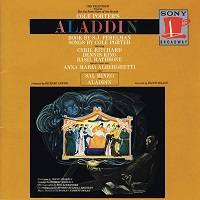 Original Television Cast, 1958 (Columbia/Sony)
Original Television Cast, 1958 (Columbia/Sony)  (3 / 5) The later-in-life work of most great musical theater writers isn’t up to the quality of their more youthful forays; but with the exception of his score for the film Les Girls, Cole Porter ended his career somewhere close to his high standard. Aladdin was an original television musical, a popular entertainment form at the time. Major teams such as Rodgers & Hammerstein, Bock & Harnick, and other great composers and lyricists contributed to the genre, with mixed results. Porter’s Aladdin, with a libretto by S.J. Perelman, was among the best of the bunch. produced at the end of a wonderful era wherein most entertainment suitable for children was equally enjoyable for adults. Apart from its tuneful and witty score, it had a dream cast: stage veterans Dennis King and Cyril Ritchard, film favorites Una Merkel and Basil Rathbone, and newcomers Anna Maria Alberghetti and Sal Mineo. All of them brought their unique talents to the project. A highlight of the score and the highly enjoyable cast album is “Come to the Supermarket (in Old Peking.” — Ken Bloom
(3 / 5) The later-in-life work of most great musical theater writers isn’t up to the quality of their more youthful forays; but with the exception of his score for the film Les Girls, Cole Porter ended his career somewhere close to his high standard. Aladdin was an original television musical, a popular entertainment form at the time. Major teams such as Rodgers & Hammerstein, Bock & Harnick, and other great composers and lyricists contributed to the genre, with mixed results. Porter’s Aladdin, with a libretto by S.J. Perelman, was among the best of the bunch. produced at the end of a wonderful era wherein most entertainment suitable for children was equally enjoyable for adults. Apart from its tuneful and witty score, it had a dream cast: stage veterans Dennis King and Cyril Ritchard, film favorites Una Merkel and Basil Rathbone, and newcomers Anna Maria Alberghetti and Sal Mineo. All of them brought their unique talents to the project. A highlight of the score and the highly enjoyable cast album is “Come to the Supermarket (in Old Peking.” — Ken Bloom
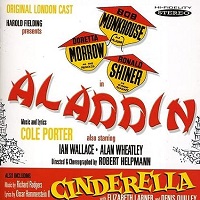 Original London Cast, 1960 (Columbia/DRG)
Original London Cast, 1960 (Columbia/DRG)  (1 / 5) Cole Porter’s Aladdin was never adapted for presentation on Broadway, but the London stage production — tarted up as a Christmas pantomime — yielded this unfortunate recording. It includes a few songs interpolated from other Porter shows, none of which fit the spirit and tone of the original; they’re too jazzy and out-of period. Doretta Morrow displays a wonderful voice on the recording, but it sounds, shall we say, too mature for the character of the princess. (She does offer a first-class rendition of “I Am Loved,” interpolated from Out of This World.) Cyril Ritchard is sorely missed on this recording, as is the maturity and authority of Dennis King. And whereas the original TV production had great orchestrations by Robert Russell Bennett, this one features more “mod” arrangements that haven’t withstood the test of time. — K.B.
(1 / 5) Cole Porter’s Aladdin was never adapted for presentation on Broadway, but the London stage production — tarted up as a Christmas pantomime — yielded this unfortunate recording. It includes a few songs interpolated from other Porter shows, none of which fit the spirit and tone of the original; they’re too jazzy and out-of period. Doretta Morrow displays a wonderful voice on the recording, but it sounds, shall we say, too mature for the character of the princess. (She does offer a first-class rendition of “I Am Loved,” interpolated from Out of This World.) Cyril Ritchard is sorely missed on this recording, as is the maturity and authority of Dennis King. And whereas the original TV production had great orchestrations by Robert Russell Bennett, this one features more “mod” arrangements that haven’t withstood the test of time. — K.B.
Ain’t Supposed to Die a Natural Death
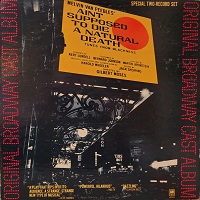 Original Broadway Cast, 1971 (A&R, 2LPs; no CD)
Original Broadway Cast, 1971 (A&R, 2LPs; no CD)  (2 / 5) Onstage, this piece with book, music, and lyrics by Melvin van Peebles was intensely theatrical; I was actually frightened when cast member Minnie Gentry looked straight at me and vowed to “Put a Curse on You.” On record, it’s a less powerful experience — an interesting assemblage of jazz-based songs, dramatic monologues, and narratives delivered by a cast including Bill Duke, Albert Hall, Garrett Morris, and Beatrice Winde. (Ossie Davis and Phylicia Rashad joined the company in 1972, after this recording was made.) Much of the show is written in what might be called a “street poetry” style, if that phrase is not too pretentious. Ain’t Supposed to Die a Natural Death is skillfully constructed, with the songs and the very attractive underscoring enhancing the monologues as they move into, out of, and around them. I can’t say this is a cast album I listen to every day, but if you can find a copy, it certainly won’t bore you. — David Wolf
(2 / 5) Onstage, this piece with book, music, and lyrics by Melvin van Peebles was intensely theatrical; I was actually frightened when cast member Minnie Gentry looked straight at me and vowed to “Put a Curse on You.” On record, it’s a less powerful experience — an interesting assemblage of jazz-based songs, dramatic monologues, and narratives delivered by a cast including Bill Duke, Albert Hall, Garrett Morris, and Beatrice Winde. (Ossie Davis and Phylicia Rashad joined the company in 1972, after this recording was made.) Much of the show is written in what might be called a “street poetry” style, if that phrase is not too pretentious. Ain’t Supposed to Die a Natural Death is skillfully constructed, with the songs and the very attractive underscoring enhancing the monologues as they move into, out of, and around them. I can’t say this is a cast album I listen to every day, but if you can find a copy, it certainly won’t bore you. — David Wolf
After the Fair
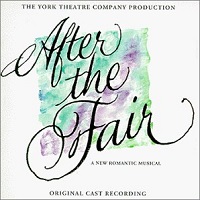 Original Off-Broadway Cast, 1999 (Varèse Sarabande)
Original Off-Broadway Cast, 1999 (Varèse Sarabande)  (2 / 5) It’s the very model of a modern chamber musical: a four-character, four-musician adaptation of a Thomas Hardy short story, here brought to life by Matthew Ward (music) and Stephen Cole (book and lyrics), and lovingly recorded by producer Bruce Kimmel. The slight plot — about a bored, unhappy, provincial couple (Michele Pawk and David Staller) and the wife’s Cyranoesque adventures in helping her maid (Jennifer Piech) conduct a romance with a London barrister (James Ludwig) — comes through clearly and affectingly. Cole’s lyrical craftmanship is striking (“With each passing missive, you grew more passive”) , and Ward’s music, aside from some dreary recitative, isn’t afraid of tunefulness or smart melodic development when the occasion demands. Diligent as the authors are, though, the score’s a bit studied; it sounds something like a Sondheim disciple’s thesis for a graduate degree in musical theater. And the unvarying parade of duets, quartets, and genteel accompaniment adds up to a rather limited musical palette. (Maybe the score worked better in the context of the show onstage.) The cast is variable: Pawk is excellent, Ludwig is sturdy, but you could drive a lorry through the hammy Staller’s vibrato, and Piech’s cartoon-Brit accent simply won’t do. Who was her dialect coach, Dick Van Dyke? — Marc Miller
(2 / 5) It’s the very model of a modern chamber musical: a four-character, four-musician adaptation of a Thomas Hardy short story, here brought to life by Matthew Ward (music) and Stephen Cole (book and lyrics), and lovingly recorded by producer Bruce Kimmel. The slight plot — about a bored, unhappy, provincial couple (Michele Pawk and David Staller) and the wife’s Cyranoesque adventures in helping her maid (Jennifer Piech) conduct a romance with a London barrister (James Ludwig) — comes through clearly and affectingly. Cole’s lyrical craftmanship is striking (“With each passing missive, you grew more passive”) , and Ward’s music, aside from some dreary recitative, isn’t afraid of tunefulness or smart melodic development when the occasion demands. Diligent as the authors are, though, the score’s a bit studied; it sounds something like a Sondheim disciple’s thesis for a graduate degree in musical theater. And the unvarying parade of duets, quartets, and genteel accompaniment adds up to a rather limited musical palette. (Maybe the score worked better in the context of the show onstage.) The cast is variable: Pawk is excellent, Ludwig is sturdy, but you could drive a lorry through the hammy Staller’s vibrato, and Piech’s cartoon-Brit accent simply won’t do. Who was her dialect coach, Dick Van Dyke? — Marc Miller
New York, New York
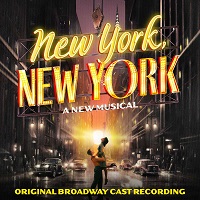 Original Broadway Cast, 2023 (Wine & Peaches LLC)
Original Broadway Cast, 2023 (Wine & Peaches LLC)  (0.5 / 5) New York, New York is destined to go down in musical theater history books for its creative team, which includes the legendary composer John Kander as well as director/choreographer Susan Stroman and lyricist Lin Manuel Miranda, who spearheaded the two most Tony-nominated musicals of all time. Unfortunately, the show itself will be remembered as a colossal disappointment: Rather than a love letter to the city that doesn’t sleep, or even to the post-WW II era in which the action takes place, what we have here is a misguided mishmash of weaker items from the Kander & Ebb repertoire forced into a stage musical with the number of main and featured characters greatly expanded from the film on which it is very loosely based. The plot largely concerns the troubled romance between struggling musician Jimmy Doyle and struggling singer Francine Evans, but the creators seem to have determined that these characters weren’t interesting enough for an entire show. As a result, also on hand to clutter up the proceedings are an Hispanic immigrant and his abusive father and loving mother, a cleaning woman turned opera singer, a Jewish immigrant and his violin teacher, et al. “A Quell ‘Amor,” performed by the newly minted opera singer, is perhaps the nadir of the show; it makes no sense in or out of context, we never hear from its singer again, and the song’s title is 50% of its lyrics. Indeed, lyrics are not the primary concern of this production, as shown by the inclusion of six extended instrumental pieces titled “Morning in New York,” “New York in the Rain,” “New York in the Summer,” “New York in the Snow,” “New York at Night,” and “New York Concerto.” (Orchestrators Sam Davis and Daryl Waters have done an admirable job of creating a period feel and an excitement that’s lacking in the plot.) One of the oddest aspects of the show and this album is the fact that Colton Ryan, who portrays Jimmy Doyle, sings every song as if he were being strangled, emitting some of the ugliest vowel sounds ever heard. On the other hand, Anna Uzele as Francine raises the roof with her big numbers, but her acting is not quite at the level of her vocal ability. The only two pitch-perfect performances are from Emily Skinner, as the aforementioned violin teacher, and the sadly underused Clyde Alves, as the leading man’s best friend. Four demo recording are appended to this album, and in the tracks where you can hear Fred Ebb singing his own material, you start to understand what this show could’ve been if that great lyricist had lived longer: a unique, biting, entertaining final curtain call for Kander & Ebb. Instead, listeners may end up, to quote one of the show’s stronger songs, sorry they asked. — Charles Kirsch
(0.5 / 5) New York, New York is destined to go down in musical theater history books for its creative team, which includes the legendary composer John Kander as well as director/choreographer Susan Stroman and lyricist Lin Manuel Miranda, who spearheaded the two most Tony-nominated musicals of all time. Unfortunately, the show itself will be remembered as a colossal disappointment: Rather than a love letter to the city that doesn’t sleep, or even to the post-WW II era in which the action takes place, what we have here is a misguided mishmash of weaker items from the Kander & Ebb repertoire forced into a stage musical with the number of main and featured characters greatly expanded from the film on which it is very loosely based. The plot largely concerns the troubled romance between struggling musician Jimmy Doyle and struggling singer Francine Evans, but the creators seem to have determined that these characters weren’t interesting enough for an entire show. As a result, also on hand to clutter up the proceedings are an Hispanic immigrant and his abusive father and loving mother, a cleaning woman turned opera singer, a Jewish immigrant and his violin teacher, et al. “A Quell ‘Amor,” performed by the newly minted opera singer, is perhaps the nadir of the show; it makes no sense in or out of context, we never hear from its singer again, and the song’s title is 50% of its lyrics. Indeed, lyrics are not the primary concern of this production, as shown by the inclusion of six extended instrumental pieces titled “Morning in New York,” “New York in the Rain,” “New York in the Summer,” “New York in the Snow,” “New York at Night,” and “New York Concerto.” (Orchestrators Sam Davis and Daryl Waters have done an admirable job of creating a period feel and an excitement that’s lacking in the plot.) One of the oddest aspects of the show and this album is the fact that Colton Ryan, who portrays Jimmy Doyle, sings every song as if he were being strangled, emitting some of the ugliest vowel sounds ever heard. On the other hand, Anna Uzele as Francine raises the roof with her big numbers, but her acting is not quite at the level of her vocal ability. The only two pitch-perfect performances are from Emily Skinner, as the aforementioned violin teacher, and the sadly underused Clyde Alves, as the leading man’s best friend. Four demo recording are appended to this album, and in the tracks where you can hear Fred Ebb singing his own material, you start to understand what this show could’ve been if that great lyricist had lived longer: a unique, biting, entertaining final curtain call for Kander & Ebb. Instead, listeners may end up, to quote one of the show’s stronger songs, sorry they asked. — Charles Kirsch
KPOP
 Original Broadway Cast, 2023 (Masterworks Broadway)
Original Broadway Cast, 2023 (Masterworks Broadway)  (0.5 / 5) In 2021, the South Korean music industry earned around $773 million in revenue, a figure that has been increasing since K-pop as a genre began. Listening to the cast album of the Broadway musical that attempted to celebrate that art form, one question may present itself: Why? Helen Park and Max Vernon’s score does not do much to provide an answer. It’s painfully generic, veering between the cheapest, loudest form of electronic dance music, energetic pop in the style of Britney Spears, and the sappiest ballads heard on Broadway in recent memory, without ever landing on its own style. As for the lyrics, there are rhymes and off-rhymes such as “America/hysterical/generic-uh.” Like so many musicals before it, KPOP was built around a star — in this case, a Korean musical theater actress and K-pop singer named Luna. She is unquestionably talented in terms of vocal range and power, but neither she nor the rest of the cast members are well served by the material, and because of the ensemble’s non-specific diction, it’s often hard to tell which of the two languages that the show incorporates is being sung. Almost every song in this score is diegetic, performed as part of the concerts-within-the-show. As a result, the musical’s tenuous emotional arc, concerning a pseudo-Mama Rose who has pushed MwE (the character portrayed by Luna) to succeed, is totally lost in an audio recording that eliminates the book scenes. Of course, neither can the Broadway production’s highly energetic choreography or its bright, fun costumes be experienced via the cast album, which removes about 85% of what this show had to offer. Ironically, the album makes it eminently clear that this music was not meant to be listened to on its own, and you may find it difficult to distinguish any particular song from the rest. The one worthy exception is “Still I Love You,” a musical theater-esque song delivered by Luna with great beauty. While the last song of the show is titled “Blast Off,” it may appear to listeners that KPOP never rises above the level of elevator music. — Charles Kirsch
(0.5 / 5) In 2021, the South Korean music industry earned around $773 million in revenue, a figure that has been increasing since K-pop as a genre began. Listening to the cast album of the Broadway musical that attempted to celebrate that art form, one question may present itself: Why? Helen Park and Max Vernon’s score does not do much to provide an answer. It’s painfully generic, veering between the cheapest, loudest form of electronic dance music, energetic pop in the style of Britney Spears, and the sappiest ballads heard on Broadway in recent memory, without ever landing on its own style. As for the lyrics, there are rhymes and off-rhymes such as “America/hysterical/generic-uh.” Like so many musicals before it, KPOP was built around a star — in this case, a Korean musical theater actress and K-pop singer named Luna. She is unquestionably talented in terms of vocal range and power, but neither she nor the rest of the cast members are well served by the material, and because of the ensemble’s non-specific diction, it’s often hard to tell which of the two languages that the show incorporates is being sung. Almost every song in this score is diegetic, performed as part of the concerts-within-the-show. As a result, the musical’s tenuous emotional arc, concerning a pseudo-Mama Rose who has pushed MwE (the character portrayed by Luna) to succeed, is totally lost in an audio recording that eliminates the book scenes. Of course, neither can the Broadway production’s highly energetic choreography or its bright, fun costumes be experienced via the cast album, which removes about 85% of what this show had to offer. Ironically, the album makes it eminently clear that this music was not meant to be listened to on its own, and you may find it difficult to distinguish any particular song from the rest. The one worthy exception is “Still I Love You,” a musical theater-esque song delivered by Luna with great beauty. While the last song of the show is titled “Blast Off,” it may appear to listeners that KPOP never rises above the level of elevator music. — Charles Kirsch
Some Like It Hot
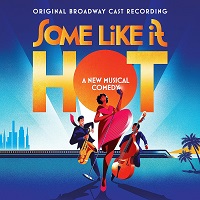 Original Broadway Cast, 2023 (Concord Theatricals)
Original Broadway Cast, 2023 (Concord Theatricals)  (2 / 5) Broadway musicals based on movies are nothing new, but Billy Wilder’s masterpiece Some Like it Hot may hold the distinction of being the only movie to serve as the basis for two Broadway musicals. First, there was Jule Styne, Bob Merrill, and Peter Stone’s attempt in 1972, resulting in the inoffensive but unimpressive Sugar. And now, 50 years later, Marc Shaiman and Scott Wittman, working in collaboration with book writers Matthew Lopez and Amber Ruffin, have taken their shot. Shaiman and Wittman brought an electrifying originality to their stellar pastiche score for Hairspray, so the duo might have seemed a perfect fit to write a ’20s-era jazz score with a modern twist. The Lopez/Ruffin book aims to expand upon the movie’s themes of gender and sexuality with more currency, and an excitingly diverse cast has been assembled this time around, so the new version appeared to have all the ingredients necessary to supplant 1972’s missed opportunity. And yet, it still doesn’t make a strong enough case for musicalizing the source material. Shaiman and Wittman’s lyrics are as succinct and cheeky as ever (“You Can’t Have Me If You Don’t Have Him,” “Poor Little Millionaire”), but Shaiman’s music lacks identity; if everything sounds enjoyable in a pastiche way, nothing sounds distinctive. While the cast album gets off to a fun, hyper start with “What are You Thirsty For?”, each song that follows insists on maintaining that same level of energy, so the score soon begins to sound frenetic as the songs blend together and/or remind you of jingles from the past. (The title song bears a very strong resemblance to the theme song from the old animated TV show Huckleberry Hound.) And though Charlie Rosen and Bryan Carter’s orchestrations are properly splashy and broad, they lack the steam that makes jazz of the ’20s special. Some of the cast members do strong work, J. Harrison Ghee scoring with Jerry/Daphne’s Act 2 showstopper “You Coulda Knocked Me Over With a Feather” and Kevin Del Aguila perfect as the impish millionaire Osgood in “Let’s Be Bad.” Less successful are Christian Borle as Joe/Josephine and Adrianna Hicks as Sugar Kane; while Borle is always an entertaining presence, he’s rather miscast as the caddish Joe, and Hicks comes across as too polished for the messy Sugar. It’s also unfortunate that Shaiman and Wittman felt the need to make Hicks reach for the rafters of her upper register in the final verse of every one of Sugar’s songs, such as “A Darker Shade of Blue” and “Ride Out the Storm.” Even though Hicks handles it all with ease and aplomb, it would’ve been nice to hear more of Sugar’s vulnerability in softer, more lyrical singing. But that, in a nut shell, is what keeps this score from taking off: It’s so eager to get hot that it never stops to consider when it can relax and simmer instead of boil and bubble. — Matt Koplik
(2 / 5) Broadway musicals based on movies are nothing new, but Billy Wilder’s masterpiece Some Like it Hot may hold the distinction of being the only movie to serve as the basis for two Broadway musicals. First, there was Jule Styne, Bob Merrill, and Peter Stone’s attempt in 1972, resulting in the inoffensive but unimpressive Sugar. And now, 50 years later, Marc Shaiman and Scott Wittman, working in collaboration with book writers Matthew Lopez and Amber Ruffin, have taken their shot. Shaiman and Wittman brought an electrifying originality to their stellar pastiche score for Hairspray, so the duo might have seemed a perfect fit to write a ’20s-era jazz score with a modern twist. The Lopez/Ruffin book aims to expand upon the movie’s themes of gender and sexuality with more currency, and an excitingly diverse cast has been assembled this time around, so the new version appeared to have all the ingredients necessary to supplant 1972’s missed opportunity. And yet, it still doesn’t make a strong enough case for musicalizing the source material. Shaiman and Wittman’s lyrics are as succinct and cheeky as ever (“You Can’t Have Me If You Don’t Have Him,” “Poor Little Millionaire”), but Shaiman’s music lacks identity; if everything sounds enjoyable in a pastiche way, nothing sounds distinctive. While the cast album gets off to a fun, hyper start with “What are You Thirsty For?”, each song that follows insists on maintaining that same level of energy, so the score soon begins to sound frenetic as the songs blend together and/or remind you of jingles from the past. (The title song bears a very strong resemblance to the theme song from the old animated TV show Huckleberry Hound.) And though Charlie Rosen and Bryan Carter’s orchestrations are properly splashy and broad, they lack the steam that makes jazz of the ’20s special. Some of the cast members do strong work, J. Harrison Ghee scoring with Jerry/Daphne’s Act 2 showstopper “You Coulda Knocked Me Over With a Feather” and Kevin Del Aguila perfect as the impish millionaire Osgood in “Let’s Be Bad.” Less successful are Christian Borle as Joe/Josephine and Adrianna Hicks as Sugar Kane; while Borle is always an entertaining presence, he’s rather miscast as the caddish Joe, and Hicks comes across as too polished for the messy Sugar. It’s also unfortunate that Shaiman and Wittman felt the need to make Hicks reach for the rafters of her upper register in the final verse of every one of Sugar’s songs, such as “A Darker Shade of Blue” and “Ride Out the Storm.” Even though Hicks handles it all with ease and aplomb, it would’ve been nice to hear more of Sugar’s vulnerability in softer, more lyrical singing. But that, in a nut shell, is what keeps this score from taking off: It’s so eager to get hot that it never stops to consider when it can relax and simmer instead of boil and bubble. — Matt Koplik
As You Like It
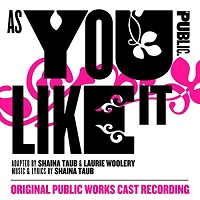 Original Public Works Cast, 2022 (Concord Theatrical Recordings)
Original Public Works Cast, 2022 (Concord Theatrical Recordings)  (3 / 5) The second of composer-lyricist Shaina Taub’s Shakespeare adaptations for the Public Theater’s Public Works program, following Twelfth Night, this As You Like It is a joyful update of Shakespeare’s comedy. In songs like “You Phoebe Me” and “Gettin’ Married Tomorrow,” Taub playfully riffs on Shakespeare’s text in her lyrics. These songs sound closer to those that may be heard on Taub’s solo singer-songwriter albums than to her work on Twelfth Night, so Rosalind sings with a confessional, conversational cynicism in Rebecca Naomi Jones’s thoughtful, strongly-sung performance. Ato Blankson-Wood, who played Orsino in Twelfth Night, sounds wonderful again here. Taub herself is the best interpreter of Taub, and her opening delivery of “All The World’s A Stage” as the moody Jacques (reimagined here as a climate activist) is the album’s highlight. If you’re somehow immune to her charming navigation of her bluesy pop melodies, the chorus of children joining in her song will win you over. These young singers are part of Public Works’ engagement in each of these productions of nearly 100 performers, most of them amateurs, through partnering community organizations. The numerous ensemble moments heard here — including the rousing “In Arden,” led by Darius de Haas, and the gospel-inspired anthem “Still I Will Love” — capture the sense of massive community singing better than the Twelfth Night cast album does. But there’s a little bit of you-had-to-be-there energy to the recording; it’s the memory of the Public’s multi-generational staging that lends these tracks their greatest emotional potency. — Dan Rubins
(3 / 5) The second of composer-lyricist Shaina Taub’s Shakespeare adaptations for the Public Theater’s Public Works program, following Twelfth Night, this As You Like It is a joyful update of Shakespeare’s comedy. In songs like “You Phoebe Me” and “Gettin’ Married Tomorrow,” Taub playfully riffs on Shakespeare’s text in her lyrics. These songs sound closer to those that may be heard on Taub’s solo singer-songwriter albums than to her work on Twelfth Night, so Rosalind sings with a confessional, conversational cynicism in Rebecca Naomi Jones’s thoughtful, strongly-sung performance. Ato Blankson-Wood, who played Orsino in Twelfth Night, sounds wonderful again here. Taub herself is the best interpreter of Taub, and her opening delivery of “All The World’s A Stage” as the moody Jacques (reimagined here as a climate activist) is the album’s highlight. If you’re somehow immune to her charming navigation of her bluesy pop melodies, the chorus of children joining in her song will win you over. These young singers are part of Public Works’ engagement in each of these productions of nearly 100 performers, most of them amateurs, through partnering community organizations. The numerous ensemble moments heard here — including the rousing “In Arden,” led by Darius de Haas, and the gospel-inspired anthem “Still I Will Love” — capture the sense of massive community singing better than the Twelfth Night cast album does. But there’s a little bit of you-had-to-be-there energy to the recording; it’s the memory of the Public’s multi-generational staging that lends these tracks their greatest emotional potency. — Dan Rubins
Twelfth Night
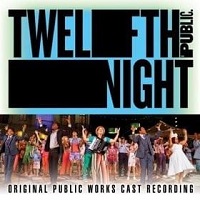 Original Public Works Cast, 2018 (Craft Recordings)
Original Public Works Cast, 2018 (Craft Recordings)  (4 / 5) The first (and better) of Shaina Taub’s pair of Shakespeare-inspired scores for the Public Theater’s Public Works program, Twelfth Night marvelously marries Taub’s distinctive blues-inflected funk pop vocabulary with Mike Brun’s New Orleans brass arrangements. Taub turns Shakespeare into an ideal collaborator; spoken excerpts of the play’s text weave seamlessly in and out of the songs, and Taub finds the germ of each song in Shakespeare’s language. A well-constructed opening number, “Play On,” musically stresses the story’s love triangle. Nikki M. James (Viola), Nanya-Akuki Goodrich (Olivia), and Ato Blankson-Wood (Orsino) all sing terrifically, and Taub frequently throws her characters into sinewy, climactic counterpoints that capture the play’s tangled romantic webs. The comic material for Sir Toby Belch (Shuler Hensley) and Malvolio (Andrew Kober) is slighter stuff, but Taub adds in a few fun ensemble numbers (example: “Word on the Street”) for Illyria’s gossipy citizenry. Best of all is “Is This Not Love,” a ballad sung yearningly first by Taub herself as the clown, Feste, and then reprised powerfully by ensemble member Vivian Jett. — Dan Rubins
(4 / 5) The first (and better) of Shaina Taub’s pair of Shakespeare-inspired scores for the Public Theater’s Public Works program, Twelfth Night marvelously marries Taub’s distinctive blues-inflected funk pop vocabulary with Mike Brun’s New Orleans brass arrangements. Taub turns Shakespeare into an ideal collaborator; spoken excerpts of the play’s text weave seamlessly in and out of the songs, and Taub finds the germ of each song in Shakespeare’s language. A well-constructed opening number, “Play On,” musically stresses the story’s love triangle. Nikki M. James (Viola), Nanya-Akuki Goodrich (Olivia), and Ato Blankson-Wood (Orsino) all sing terrifically, and Taub frequently throws her characters into sinewy, climactic counterpoints that capture the play’s tangled romantic webs. The comic material for Sir Toby Belch (Shuler Hensley) and Malvolio (Andrew Kober) is slighter stuff, but Taub adds in a few fun ensemble numbers (example: “Word on the Street”) for Illyria’s gossipy citizenry. Best of all is “Is This Not Love,” a ballad sung yearningly first by Taub herself as the clown, Feste, and then reprised powerfully by ensemble member Vivian Jett. — Dan Rubins
Wonderland
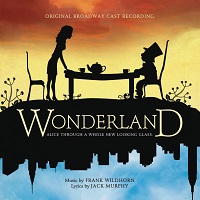 Original Broadway Cast, 2011 (Masterworks Broadway)
Original Broadway Cast, 2011 (Masterworks Broadway)  (3 / 5) If you’re looking for an under-the-radar guilty pleasure album, you could do worse than Wonderland. It’s the silliest and least self-important of Frank Wildhorn’s scores, and the first act especially is a wacky delight. “We’re all a little nuts, in case you didn’t know,” the denizens of Wonderland tell an all-grown-up Alice (Janet Dacal) in this unconvincing twist on Lewis Carroll (please don’t listen for the plot), and the music is a little nuts, too. The Wonderland setting and the panoply of fantasy characters allow Wildhorn to pastiche any style he can think of: there’s a soulful caterpillar (E. Clayton Cornelious), a pop salsa-dancing Cheshire Cat called El Gato (Jose Llana), and a boy band-fronting White Knight (Darren Ritchie). Their trio of songs, which come back-to-back-to-back early on the album, are well-made, playful, and fun. Dacal, whose Alice communicates exclusively through a pop belt dialed up to 11, is always an appealing vocal presence, especially in the aggressively catchy “Through the Looking Glass.” They’re all overshadowed, though, by the extraordinary Kate Shindle (before her election to the presidency of Actors’ Equity) as an electrifyingly villainous Mad Hatter who screlts to bring the chandelier down. The versatile orchestrations, by Wildhorn’s frequent collaborator Kim Scharnberg, are a hoot. Alas, the second act is an unoriginal slog until the finale, “Finding Wonderland,” which recalls The Wiz’s “Home” (as opposed to this show’s sweet opening number, also called “Home”) and showcases Dacal’s substantial gifts. — Dan Rubins
(3 / 5) If you’re looking for an under-the-radar guilty pleasure album, you could do worse than Wonderland. It’s the silliest and least self-important of Frank Wildhorn’s scores, and the first act especially is a wacky delight. “We’re all a little nuts, in case you didn’t know,” the denizens of Wonderland tell an all-grown-up Alice (Janet Dacal) in this unconvincing twist on Lewis Carroll (please don’t listen for the plot), and the music is a little nuts, too. The Wonderland setting and the panoply of fantasy characters allow Wildhorn to pastiche any style he can think of: there’s a soulful caterpillar (E. Clayton Cornelious), a pop salsa-dancing Cheshire Cat called El Gato (Jose Llana), and a boy band-fronting White Knight (Darren Ritchie). Their trio of songs, which come back-to-back-to-back early on the album, are well-made, playful, and fun. Dacal, whose Alice communicates exclusively through a pop belt dialed up to 11, is always an appealing vocal presence, especially in the aggressively catchy “Through the Looking Glass.” They’re all overshadowed, though, by the extraordinary Kate Shindle (before her election to the presidency of Actors’ Equity) as an electrifyingly villainous Mad Hatter who screlts to bring the chandelier down. The versatile orchestrations, by Wildhorn’s frequent collaborator Kim Scharnberg, are a hoot. Alas, the second act is an unoriginal slog until the finale, “Finding Wonderland,” which recalls The Wiz’s “Home” (as opposed to this show’s sweet opening number, also called “Home”) and showcases Dacal’s substantial gifts. — Dan Rubins

